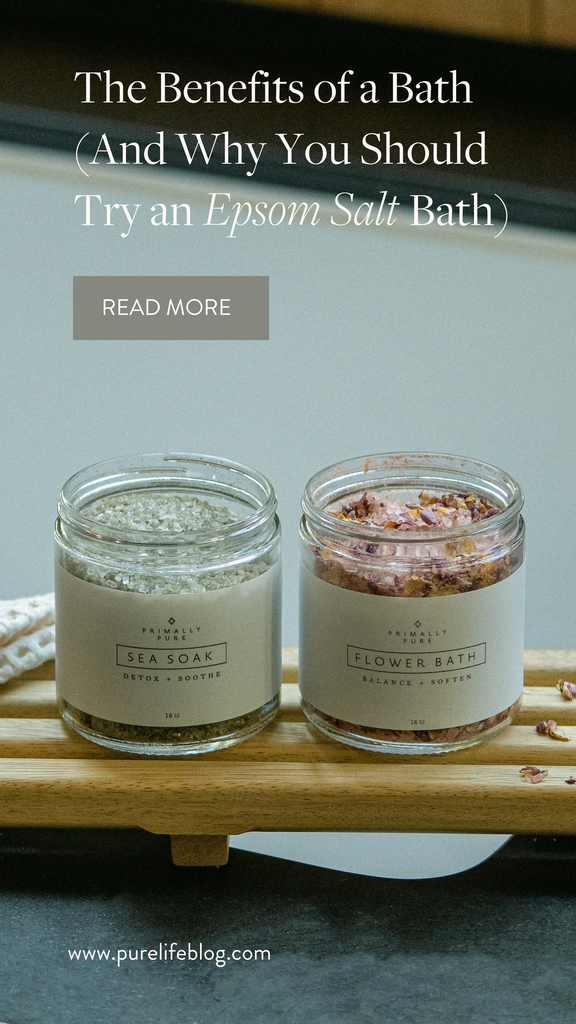The Benefits of a Hot Bath (And Why You Should Try an Epsom Salt Bath)
Summary
Is a hot bath part of your routine to care for your body + mind? There are proven scientific benefits behind indulging in a daily hot bath – time to get soaking.Are you a hot bath person?
Some people love baths, while others can’t be bothered.
Whether you’re an avid bath-taker or maybe just curious enough to consider it, a hot bath has a lot to offer. And don’t worry, it’s not just opinionated – even though we ARE lovers of a good hot bath. ;) There’s actual science behind why baths are good for you.
Even just taking a hot bath for 15 minutes a few times a week could make a big difference in your physical, mental, + emotional health.
But first, let’s look at the fascinating history of baths – and how they’ve evolved through the years.
How the Hot Bath Has Evolved Over Time
Have humans always bathed? Well, yes. But not in the ways you might assume. Ancient cultures often had very different reasons for bathing than modern-day humans.
We know that animals groom to avoid disease. Humans' first instances of washing were probably much the same – an instinct to avoid disease or “groom.” And it should go without saying – they were not taking a hot bath.
Instincts probably told them to bathe in a river or lake. It’s possible ancient people used bathing to cool down in hotter climates. Early civilizations soon changed the concept of bathing – but far from today’s vision of a hot bath, the bathing ritual wasn’t for hygiene.1
Two of the biggest differences and recurring themes we find throughout history:
Sounds pretty different than what we think of with a hot bath, huh?
Here’s where the more formal version of baths really started.
Bath Houses + Public Baths in the Ancient World
Baths are probably most well-known as part of Ancient Roman culture and other parts of Europe. The concept of public baths quickly became widespread throughout the ancient world.
Similar to some of the first instances of bathing, these public baths weren’t like the household bath we think of today – though they did often involve a hot bath.
Bathhouses were socializing places where friends and family gathered. There was co-bathing, with many “stages,” including steam, hot water, cold water, sitz baths, etc. If you’ve ever been to a traditional bathhouse, you might be familiar with this routine. (It’s pretty cool – try it out if you ever get the chance.)
In Roman times, the hot bath was created with natural hot water springs or braziers. After the 1st century BCE, they started utilizing underground heating systems with wood furnaces laid beneath the floors to create a hot bath experience.2
But a key difference from today’s baths: Romans didn’t use soap. They simply rubbed oils into their skin and then scraped it off with a metal scraper to remove dirt and dead skin.3 (Reminds us of using oil to cleanse our faces at PP. ;))
Meanwhile, in other places, like France, they hardly bathed.
America took things in a different direction – baths became used purely for medicinal purposes.
Bathing in America
In America, there was a different approach altogether.
Bathing was not a social or hygienic event – and it took a while for the hot bath to make its appearance. In the mid-to-late 1800s, a brief plunge in cold water was commonly accepted as the only type of “bath” needed. Medical professionals swore by this method to relieve “congestion of the brain and fight anything from cholera to whooping cough.”4
→ Perhaps this was the original origin of cold therapy?
It’s interesting to see how early Americans viewed the use of soap:5
“The focus of bathing was not to remove dirt, and few experts suggested the use of soap. One physician recommended soap only for excessively dirty bodies since it removed necessary oils from the skin.”
They were onto something with this – they instinctively knew that soap stripped the skin and the delicate microbiome.
However, by the early 1900s, daily bathing became normal.5 And from there, it was history. It’s stuck around the last century – daily hot baths (or warm baths for little ones) are the routine we’re probably most familiar with now. (Okay, aside from those days you need dry shampoo. ;))
But similar to the beliefs of medical experts in the late 1800s, it could be argued that baths are done in excess (at least, the kind involving harsh soaps). Especially with kids and babies that need to build up an immune system. Soapy, sudsy baths strip their skin of the good bacteria they need for protection.
As you can see, bathing has a winding, complex history. Though it started as a simple, instinctual practice, over time, baths evolved into a luxurious practice enjoyed by the wealthy and often involved a hot bath.
Today there are mixed opinions. But we can definitely get behind one kind of bath with proven health benefits: A hot bath.
At Primally Pure, we’re big advocates for regularly soaking in a hot bath (or even better – an Epsom salt bath). Here’s why.
Why Are Baths Good for You?
With a history of going back and forth on the purpose, frequency, and effectiveness of baths, no wonder it may not be your first thought as part of a healthy lifestyle.
But believe us when we say: a hot bath has so many incredible health benefits backed by science. Let’s start with the physical benefits.
Physical Benefits of a Hot Bath
If you enjoy soaking in a hot bath at the end of the day, here’s even more reason to take your daily bath! And if you’re not a bath-taker, buckle up – you just might become one. ;)
- Improved heart health – studies on hot baths show improved cardiac function. In fact, one study in Japan showed a 28% lowered risk for cardiovascular disease and a 26% lower risk of having a stroke.6
- Sweating detoxes the body – a good sweat from a hot bath pushes toxins out of the body. Your body doesn’t care how you sweat. As long as you do it, detox benefits will follow.
- Relaxed muscle tension – gentle heat application and the buoyancy of floating in the water gives your body a break, relaxing overworked muscles.
- Benefits in Pregnancy – Baths are recommended for pregnant women across the board – but note that if you’re pregnant, baths should be warm – not hot. Baths help maintain a healthy pregnancy and even help with labor and safe birth.
- Helps prevent charlie horses, aches, and muscle cramps
- Gives your body a break by gently supporting your body weight
- In labor, a hot bath is known as the “natural epidural”
- Peaceful waterbirths are very popular because of the relaxing effects
- Baths can even assist healing in postpartum, combined with gentle herbs and botanicals for a natural sitz bath (check out our Flower Bath bath salts)
- Improved circulation, blood flow, + blood pressure – these are major health markers that a simple hot bath can benefit.7 By extension, you’ll see improved lymphatic flow throughout the body for vibrant skin + efficient detoxification.
- Steam clears sinuses and congestion – which also applies to clearing congestion on the face! Add essential oils or one of our bath soaks to further the effects + embrace aromas that revitalize your senses.
- A hot bath is compared to exercise in many ways – “passive heating” improves:8
- Cardiorespiratory and vascular health
- Glycemic control
- Chronic low-grade inflammation
- Calories burned – about 140 calories!9
A hot bath is one of the best ways to care for yourself in an intentional, grounding, + relaxing practice. Even better? There are emotional benefits too. (If you know, you know.)
Emotional Benefits of a Hot Bath
If you’ve taken a hot bath before, you may be familiar with the euphoric feeling that accompanies soaking into the warm water – and the lighter feeling as you climb out.
A hot bath supports your emotional health in several ways:
- Time to unwind – we all know the feeling after a stressful day/week when you just need to process the day’s events and recenter yourself.
- Time to be still – in today’s go-go-go culture, it’s hard to find time to truly be still – both physically and mentally. Since the point of a hot bath is staying in the water, you’re able to slow down physically. Maybe you even meditate, pray, or practice gratitude while you soak.
- Deep breathing – you may find yourself automatically practicing deep breathing due to the calming effect of a hot bath. This has many emotional benefits as you stimulate your parasympathetic response within your body.
- Alone time – if it’s hard for you to come by a few minutes in solitude, a hot bath is a perfect excuse for some time away amid a busy schedule or young kids.
Taking the time to soak in a hot bath is full of benefits – it’s worth the time invested. And the best part? It doesn’t take any extra energy on your part – in fact, the whole point is that you’re relaxed and at ease. Speaking of feeling relaxed, there’s another way to make your hot bath even more relaxing + effective: upgrade to an Epsom salt bath.
Boost Your Hot Bath: Upgrade to an Epsom Salt Bath
A hot bath is great. We already know there are a host of benefits. But why not benefit even more by making it an Epsom salt bath?
Here’s why you’ll want to indulge in a hot bath with Epsom salt benefits ASAP.
Epsom Salt Bath Benefits
First: let’s refresh on Epsom salt. It’s a chemical compound of magnesium, sulfur, and oxygen. The magnesium content is what makes it so powerful. Magnesium plays a critical role in our bodies, with more than 300 biochemical reactions that assist your heart and nervous system. This includes the regulation of our stress responses.10,11
But here’s a sad truth: two-thirds of the population is deficient in magnesium.10
Here’s how taking an Epsom salt bath could benefit you:
- Improves sleep quality – one study showed that magnesium had a positive effect on both the quality and duration of sleep.12
- Detoxes heavy metals + toxins – take an Epsom salt bath with clay or baking soda (or add your own) to boost detoxing benefits (our bath salts contain both!).
- Soothes muscle tightness + cramps – as we know, with a hot bath, muscles relax and loosen. An Epsom salt bath will give you an added boost of soothing your body.
- Helps with skin conditions like psoriasis – an Epsom salt bath with clay can soothe + repair skin conditions that are itchy and inflamed by drawing out toxins and eliminating bad bacteria.
Lucky for you, our bath salts include a healthy dose of Epsom salts. Like magic in a little glass container, we’ve got your Epsom salt bath delivered.
Our Epsom Salts
Of course, you know we won’t miss an opportunity to share our favorite Epsom salts for detoxing, relaxing, and healing the body. Yes, we’re biased. But trust us on this: our bath salts have been carefully formulated to benefit you in the most potent + healing ways possible.
Our Epsom salts come in two unique + powerful formulas:
- Sea Soak – includes Epsom salt, dead sea salt, baking soda, french green clay, blue algae, and soothing essential oils for a spa-like aroma + experience.
→ An Epsom salt bath with this soak provides the skin and body with a unique blend of vital minerals while encouraging a gentle detox. Eucalyptus, peppermint, and spearmint essential oils deeply relax the body and mind.
- Flower Bath – includes Epsom salt, dehydrated coconut milk, pink kaolin clay, organic flower petals, and relaxing lavender + geranium for an indulgent addition to your hot bath.
→ This Epsom salt bath blend is perfect for irritated skin or postpartum healing. It contains soothing and skin-softening blends of botanicals to balance pH while gently detoxifying. (Gentle enough for pregnancy too.)
The general consensus: there are plenty of reasons to indulge in a hot bath, but especially an Epsom salt bath. Why not double your benefits?
A Simple Hack to Boost Your Health + Mindset
At Primally Pure, we believe in simple hacks + pure products that put your whole-body health front and center. You’re more than just the body you encompass, but taking care of that body – inside and out – has never been more important.
If there’s one thing we can learn about baths from our ancestors, it's this: there’s a reason we keep coming back to them. Tried and true, a bath is an easy way to unwind, care for yourself, and gently nourish your body and mind.
Embrace the ritual of a hot bath – you won’t regret it.
XO
Sources:
- Discover Magazine | A History of Bathing: It Hasn’t Always Been About Hygiene
- World History Encyclopedia | Roman Baths
- Ancient-Rome.info | Ancient Rome Public Baths
- Jstor Daily | When Americans Started Bathing
- Canadian Living | A History of Being Clean: How Clean Were Our Ancestors?
- Harvard Health Publishing: Harvard Medical School | Can Hot Baths Protect Your Heart?
- The Physiological Society: The Journal of Physiology | Passive Heat Therapy Improves Endothelial Function, Arterial Stiffness and Blood Pressure in Sedentary Humans
- Journal of Applied Physiology | The Health Benefits of Passive Heating and Aerobic Exercise: To What Extent Do the Mechanisms Overlap?
- ABC 7 | Hot Bath Just as Good as 30 Minutes of Exercise, Study Says
- National Library of Medicine | The Importance of Magnesium in Clinical Healthcare
- National Library of Medicine | Magnesium Status and Stress: The Vicious Circle Concept Revisited
- National Library of Medicine | Association of Magnesium Intake With Sleep Duration and Sleep Quality: Findings From the Cardia Study
Pin your fav blog post below:




Leave a Comment